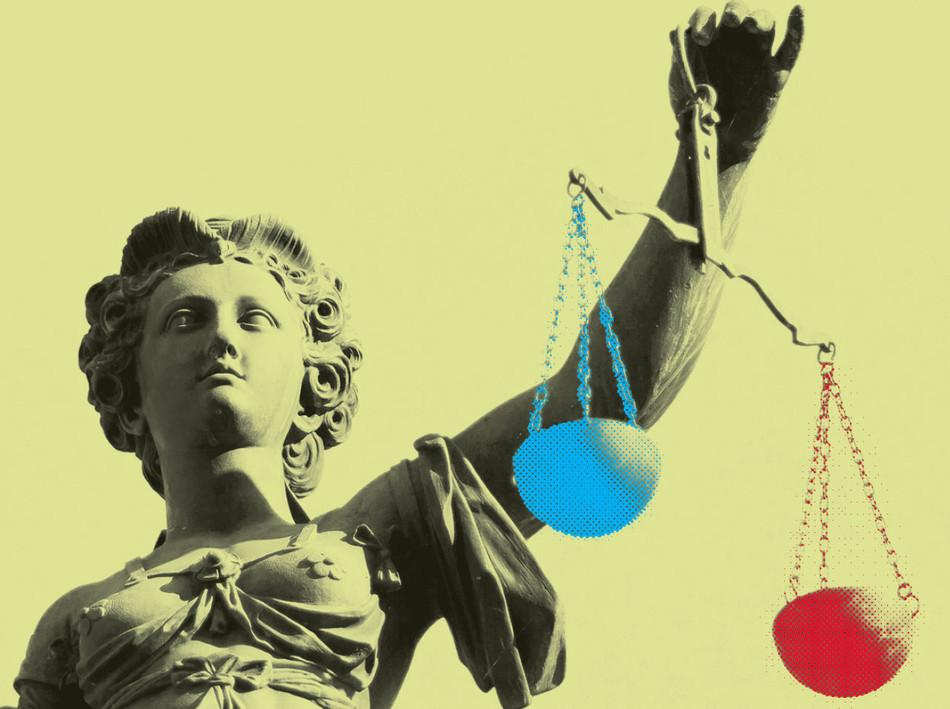The US legal system has long provided a model for judiciaries worldwide. But new research by Columbia law professor Jamal Greene shows that there is at least one way that US courts are falling behind global best practices and, in doing so, missing a crucial opportunity to tamp down political polarization in this country.
The problem, according to Greene, is in how US courts deal with cases that involve dueling claims to civil liberties, such as when a business owner’s desire to express his or her religious beliefs collides with an LGBTQ person’s demand to be treated equally under the law. Greene says that US judges, accustomed to viewing constitutional rights as absolute and unassailable, tend to look at such cases as zero-sum conflicts. Hence they consider it their responsibility to decide which party has the stronger claim to constitutional protection, a question they answer in part by considering which of the rights being cited is grounded most deeply in US legal tradition. But ranking people’s civil liberties in this way, Greene says, leaves no room for compromise. This often results in judicial rulings that hand total victory to one side and convey to the losers and to countless other Americans who identify with them that they are inconsequential in the eyes of the law.
Greene describes numerous examples of this polarizing approach to justice in his new book, How Rights Went Wrong: Why Our Obsession with Rights Is Tearing America Apart. One involves the case of the Christian baker in Colorado who in 2012, citing his First Amendment rights to free speech and religious freedom, refused to bake a wedding cake for two gay men. The couple filed a complaint under the Colorado Anti-Discrimination Act that ultimately resulted in a lawsuit, Masterpiece Cakeshop v. Colorado Civil Rights Commission. When the US Supreme Court heard the case, it ruled for the baker — an example of US judges’ tendency to treat as sacrosanct those rights that are listed in the Constitution’s first few amendments, such as freedom of speech, freedom of religion, and the right to bear arms.
In addition to LGBTQ people, Greene observes, proponents of gun restrictions, affirmative action, and disability rights have frequently found themselves on the short end of such legal clashes. Too often, he says, judges issue hard-line interpretations of constitutional law that inflame partisan passions, making it harder for opposing camps to work toward compromises on hot-button issues.
“When recognizing our neighbor’s rights necessarily extinguishes our own, a survival instinct kicks in,” he writes. “Our opponent in the rights conflict becomes not simply a fellow citizen who disagrees with us, but an enemy out to destroy us.”
For alternative approaches, Greene looks to Europe, where he finds a legal philosophy called “proportionality.” Judges who adhere to the principles of proportionality tend to concern themselves less with determining which rights should take precedence over others and more with finding fair and reasonable solutions to conflicts that respect the interests and dignity of both sides, often by requiring them to compromise. For example, if European judges had heard Masterpiece Cakeshop, Greene suggests, they might have instructed the parties to explore whether there was another artisan bakery in the vicinity to which the baker could have subcontracted the order, or to which the gay couple could have simply taken their business instead.
“Some Americans, maybe even most, wouldn’t like these solutions,” Greene acknowledges. “But the job of the courts in a pluralistic democracy isn’t to please their base. It’s to work to resolve conflicts, to ratchet them down rather than up … Too often, US courts … see their job in constitutional cases as declaring who’s right. The answer, so often, is neither side — or both.”
This article appears in the Fall 2021 print edition of Columbia Magazine with the title "When rights collide."



